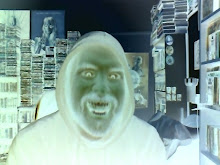You know, a lot of Star Trek fan hate the theme tune for Enterprise. It's true. They're so indoctrinated into what a Trek theme should be (bombastic, orchestral, full of rising crescendoes and strings) that a soft rock ballad sits ill with them.
Am I one of them?
Well, yes and no. I don't think it's a particularly good theme song, but I applaud the decision to do something a little different. If only that philosophy had continued on over into the show itself.
I've recently been reading a book in the BFI TV series about Star Trek, by Ina Rae Hark. She starts out with a lot of good stuff on the original series, TNG and especially DS9, then trails off when it comes to Voyager and has clearly exhausted herself by the time she comes round to discussing Enterprise. And it's really not her fault, because there's very little to talk about concerning Enterprise. Despite the alleged efforts of Berman and Braga, it's a very vacuous show. It doesn't even have the strong backbone of characters that saved Voyager (even if those characters only accounted for a third of the cast). Archer is a dullard, continuing on Trek's seeming obsession with giving characters obscure hobbies. In this case water polo.
Water polo. Fucking water polo? This is a series which, it was claimed, would get back to basics and make the characters more like us than the idealised versions from the 24th century. And what sport do they make the captain a fan of? American football? Hockey? Hell, by this point I would even accept basketball. But water polo? I mean, do you even know anybody who likes water polo let alone watches matches religiously?
Hark also points out that each of the writers of TNG who went on to DS9 and Voyager all had their own little niches - Ron Moore would do the big military stuff, Joe Menosky would handle the relationship things - and by the time of Enterprise, most of them had moved on, leaving Enterprise with a writing staff composed of two very old hands - Berman and Braga, who took writing credits on well over half the first season) and a bunch of newbies. It's telling that when they get people in who do know Trek, as when the Reeves-Stevenses are hired for the fourth season, the quality of the storytelling improves dramatically.
Enterprise's biggest flaw is that it is dull. And I'm halfway through watching Season 2 of it now. Unlike Stargate, where I was enjoying myself so much I was binging and watching a dozen or so episodes a day, I can barely watch two episodes of Enterprise back to back. They suck my will to live. And I'm speaking as a hardcore dyed in the wool Trekkie here. It's painful to see the Trek name get dragged through the mud by a show which obviously only survived as long as it did because of the network it was on and the fact that it was stamped with the brand. Had it been around instead on TNG in the late eighties, Trek would have been dead long before now.
Except it's not dead, is it? We have the movie to look foward to. Another reboot. But hopefully one that will return us to what made Trek great in the first place (and it's worth pointing out that the Trek movies still haven't surpassed Wrath Of Khan, a movie which is now twenty seven years old). And it's worth hoping that this movie brings us into the present, because modern Trek has always been a product of the eighties; like it or like it not, those first formative years of TNG established a great deal, some of which was very much a product of the time (the presence of a counsellor, the overwhelming biege-ness of it all, Picard's proclivity to call meetings while the Enterprise is under attack) and some of which was sound judgement (the Federation-Klingon alliance, the Romulans).
Mark Ritchie
(Author's Note: This was originally written for another website prior to the cinema release of the new movie)
The True Evil of Ewen Campion Clarke
10 years ago


No comments:
Post a Comment